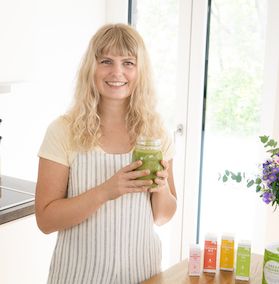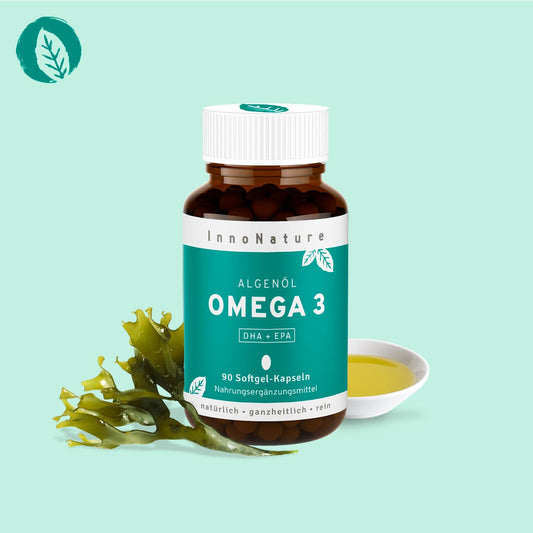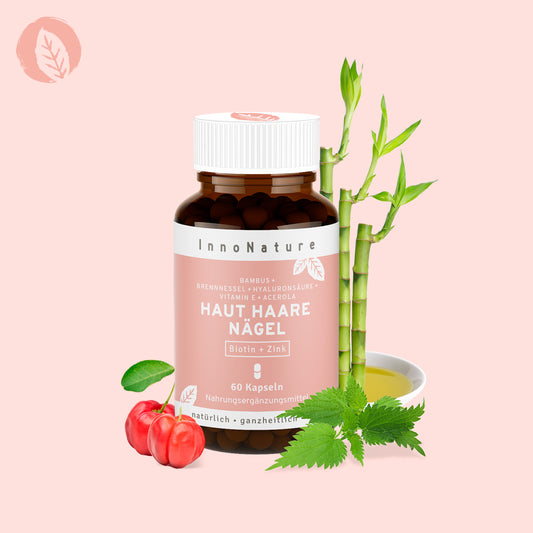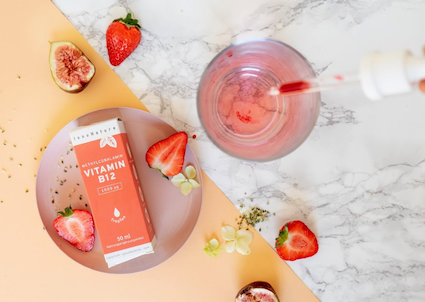
Vitamin B12 deficiency is no longer a rarity - and not only for vegans, but also for vegetarians and mixed dieters!
How do I recognize the symptoms of a B12 deficiency? And which foods actually contain B12?
Again and again we come across questions about vitamin B12. And rightly so, because: Vitamin B12 is responsible for an incredible number of functions in our organism. It is an essential vitamin that has a wide range of effects.
What is Vitamin B12 needed for?Vitamin B12 is one of the vitamins that our body cannot produce on its own. So we are dependent on regular supplies from outside.
Whether in the blood, the energy metabolism, our immune or nervous system: Vitamin B12 is a true all-rounder. It also helps to reduce tiredness - and many of us know that.

The wide range of processes in which vitamin B12 is involved also shows how diverse the symptoms can be. Here are the 5 most important ones at a glance.
Signs and Symptoms of a DeficiencyThe signs are rather insidious and very unspecific. This is due to the broad spectrum of activity of the vitamin.
Common symptoms of deficiency include:
1. Fatigue
Constant tiredness, lack of energy and listlessness are by no means "normal".
Do you get enough sleep, but are still exhausted? This could be because not enough red blood cells are produced, which are necessary for the oxygen supply. Vitamin B12 is required for this.
Without enough oxygen in your cells, even the longest cinderella slumber does not help.

2. Pale complexion
Here, too, the red blood cells play a role. Too little of it and your rosy glow will turn into a pale yellow.
3. Indigestion
Vitamin B12 plays a role in cell division, which is needed to strengthen the mucous membranes. If this is not the case, many processes can fall by the wayside. And as is so often the case, digestion is also affected here.
4. Depressive moods
Here, too, the brain plays the main role. Sufficient vitamin B12 is required for normal psychological function.
5. Difficulties with concentrating
If you lack vitamin B12, this can lead to impaired brain function. Because vitamin B12 is absolutely necessary for normal brain and nerve function.
Difficulty concentrating and forgetfulness are possible consequences here.

With these symptoms only a few are mentioned, in fact the list could be expanded a lot. However, in order to successfully counteract a deficiency, the causes should be clarified.
What are the reasons for a Vitamin B12 deficiency?Since we cannot produce vitamin B12 ourselves, there is, of course, the idea to get the vitamin from food.
And when it comes to food, we are mostly talking about animal foods.
However, regardless of your culinary preferences, you should pay attention to your vitamin B12 supply. Because eating meat does not automatically ensure a sufficient supply of vitamin B12.
Vitamin B12 In Food - An Option?
Vitamin B12 is only contained in animal protein-containing products, but not in animal fat. However, the consumption of meat or animal foods by no means guarantees an adequate supply.
By the way, animals are often given synthetic vitamin B12 these days, so that it is no longer possible to speak of a natural supply.

But let's assume that you eat enough animal products and thus also consume vitamin B12. Nevertheless, a deficiency cannot be ruled out. Why? As is so often the case, the problem lies in the intestines.
If this does not work properly, vitamin B12 cannot be optimally absorbed and utlized. This can be related to malnutrition, taking too many medications or illness. A reduced formation of gastric acid can also worsen the absorption of vitamin B12.
What your gut health has to do with vitamin B12

Let's take a closer look at this point:
Your gut is known to play a role in pretty much everything, but especially when it comes to vitamins. These are often used or even produced in the intestines, and from here they should supply your body. This is also the case with vitamin B12. In addition to the oral mucosa, vitamin B12 is only absorbed in the lower part of the small intestine. So if your intestinal function is restricted, most of the vitamin B12 is excreted unused. Even if you get it through foods of animal origin.
All of this means that the amounts ingested through animal food are often too low to stabilize the vitamin B12 balance.
During my time as a nutritionist, I often met people with a vitamin B12 deficiency, regardless of their dietary habits. It was then that I realized how important it is to educate about this topic!

Stress increases the need
Yes, you've read that correctly. Mental or physical stress can severely impair the absorption of vitamin B12. Because regardless of whether you are having an especially busy week at work or are struggling with lovesickness - your bowels will notice this and become sluggish.
One of the reasons for this is that stress leads to poor blood circulation in the digestive organs, which has a negative effect on vitamin B12 utilization. So: Just relax!
Your way out of the deficiency

In order to balance your vitamin B12 balance as quickly as possible, dietary supplements are the first step in counteracting long-term damage.
In addition, there are two holistic measures that you should pay particular attention to:
NUTRITION: Most of the vitamins and nutrients are found in natural foods. Try to take in as much of it as possible every day. Perhaps you need to take a particularly close look at your current eating habits here.
INTESTINAL HEALTH: Bring your intestinal flora into balance in order to be able to utilize vitamin B12 optimally. The first step here can be an intestinal cleanse.
In order to overcome your vitamin B12 deficiency and to be adequately supplied in the long term, the continuous intake of vitamin B12 is necessary.
For me, taking vitamin B12 is part of my daily routine. I add my B12 drops to some water or mix them into my morning smoothie.

Taking nutritional supplements should be the first step, if you want to balance your vitamin B12 requirements as quickly as possible. Because nobody should have to fear the serious long-term consequences of a deficiency.
In addition, the diet should be examined very carefully, because the goal should be to get as many vitamins and nutrients as possible from food, which is the most natural way.
Vitamin B12 as drops - the simplest and sometimes the only solution
Drops have several advantages over tablets, coated tablets and other options. First, tablets do have to be swallowed, which some people find difficult. Second, the ingestion through drops can be dosed even better and tailored to individual needs.
Like all other InnoNature products, the InnoNature Vitamin B12 drops are vegan and cruelty free (PETA certified).
In the case of a vitamin B12 deficiency, early detection is particularly helpful in preventing subsequent symptoms.
So what are you waiting for? Take your health into your own hand immediately and take precautions.

✔ Holistic effect and support with a vegan diet. To reduce tiredness, for the immune system, brain function, eyesight and much more
✔ High bioavailability
✔ 100% vegan and cruelty free (PETA certified)

Julia Lang
Consultant for holistic health® and founder of InnoNature.
I wish you all the best for your journey and send warm greetings to you!
Julia







